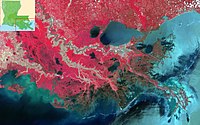
Photo from wikipedia
Hydropower is an important renewable energy, and Construction Diversion Risk (CDR) should be highlighted and assessed during hydropower development. Since sediment-rich rivers are widely existing around the world and have… Click to show full abstract
Hydropower is an important renewable energy, and Construction Diversion Risk (CDR) should be highlighted and assessed during hydropower development. Since sediment-rich rivers are widely existing around the world and have great hydro-energy potential, assessing CDR for hydropower development on sediment-rich rivers in terms of engineering feasibility is of significance. This paper proposes a CDR assessment method for the sediment-rich hydropower development environment. The method is concise and practical, reflects diversion uncertainties and correlation, and mainly adopts the Gumbel–Hougaard Copula and the Monte Carlo Simulation. Through simulating flood evolution and sediment impact during diversion, the method can assess CDR basing on the cofferdam overtopping probability. Case results show that the proposed method can achieve CDR assessment on a sediment-rich river and highlights sediment impact on the diversion risk. Through results discussion, the risk feature of construction diversion on sediment-rich rivers is revealed, that sediment impact causes the dynamic and yearly-risen CDR. Hence, our conclusions are: (1) the proposed method is feasible, effective and has industrial potential, and (2) a diversion scheme on sediment-rich rivers is suggested that adopts the design with high or yearly-heightening cofferdams, based on the advanced CDR assessment to cope with the risk features of sediment-rich diversion environments.
Journal Title: Energies
Year Published: 2020
Link to full text (if available)
Share on Social Media: Sign Up to like & get
recommendations!